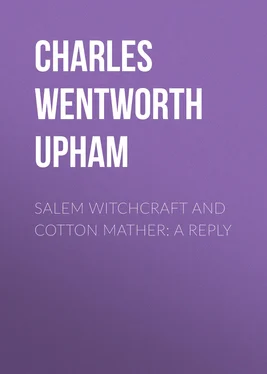Charles Wentworth Upham - Salem Witchcraft and Cotton Mather - A Reply
Здесь есть возможность читать онлайн «Charles Wentworth Upham - Salem Witchcraft and Cotton Mather - A Reply» — ознакомительный отрывок электронной книги совершенно бесплатно, а после прочтения отрывка купить полную версию. В некоторых случаях можно слушать аудио, скачать через торрент в формате fb2 и присутствует краткое содержание. Жанр: foreign_prose, История, foreign_edu, foreign_antique, на английском языке. Описание произведения, (предисловие) а так же отзывы посетителей доступны на портале библиотеки ЛибКат.
- Название:Salem Witchcraft and Cotton Mather: A Reply
- Автор:
- Жанр:
- Год:неизвестен
- ISBN:нет данных
- Рейтинг книги:3 / 5. Голосов: 1
-
Избранное:Добавить в избранное
- Отзывы:
-
Ваша оценка:
- 60
- 1
- 2
- 3
- 4
- 5
Salem Witchcraft and Cotton Mather: A Reply: краткое содержание, описание и аннотация
Предлагаем к чтению аннотацию, описание, краткое содержание или предисловие (зависит от того, что написал сам автор книги «Salem Witchcraft and Cotton Mather: A Reply»). Если вы не нашли необходимую информацию о книге — напишите в комментариях, мы постараемся отыскать её.
Salem Witchcraft and Cotton Mather: A Reply — читать онлайн ознакомительный отрывок
Ниже представлен текст книги, разбитый по страницам. Система сохранения места последней прочитанной страницы, позволяет с удобством читать онлайн бесплатно книгу «Salem Witchcraft and Cotton Mather: A Reply», без необходимости каждый раз заново искать на чём Вы остановились. Поставьте закладку, и сможете в любой момент перейти на страницу, на которой закончили чтение.
Интервал:
Закладка:
V
So great was the pressure made upon Sir William Phips, by the wild panic to which the community had been wrought, that he ordered the persons who had been committed to prison by the Salem Magistrates, to be put in irons; but his natural kindness of heart and common sense led him to relax the unjustifiable severity. Professor Bowen, in his Life of Phips , embraced in Sparks's American Biography , [ vii., 81. ] says: "Sir William seems not to have been in earnest in the proceeding; for the officers were permitted to evade the order, by putting on the irons indeed, but taking them off again, immediately."
On Tuesday, the twenty-fourth of May, the Council met to consider the matter specially assigned to that day, namely, the nomination and appointment of Judicial officers.
The Governor gave notice that he had issued Writs for the election of Representatives to convene in a General Court, to be held on the eighth of June.
He also laid before the Council, the assigned business, which was "accordingly attended, and divers persons, in the respective Counties were named, and left for further consideration."
On the twenty-fifth of May, the Council being again in session, the record says: "a further discourse was had about persons, in the several Counties, for Justices and other officers, and it was judged advisable to defer the consideration of fit persons for Judges, until there be an establishment of Courts of Justice."
At the next meeting, on the twenty-seventh of May, it was ordered that the members of the Council, severally, and their Secretary, should be Justices of the Peace and Quorum, in the respective Counties where they reside: a long list, besides, was adopted, appointing the persons named in it Justices, as also Sheriffs and Coroners; and a Special Court of Oyer and Terminer was established for the Counties of Suffolk, Essex, and Middlesex, consisting of William Stoughton, Chief-justice, John Richards, Nathaniel Saltonstall, Wait Winthrop, Bartholomew Gedney, Samuel Sewall, John Hathorne, Jonathan Corwin, and Peter Sargent, any five of them to be a quorum (Stoughton, Richards, or Gedney to be one of the five).
When we consider that the subject had been specially assigned on the seventeenth, and discussed for two days, on the twenty-fourth and twenty-fifth, to the conclusion that the appointment of Judges ought to be deferred, " until there be an establishment of Courts of Justice ,"—which by the Charter, could only be done by the General Court which was to meet, as the Governor had notified them, in less than a fortnight—the establishment of the Court of Oyer and Terminer, on the twenty-seventh, must be regarded as very extraordinary. It was acknowledged to be an unauthorized procedure; the deliberate judgment of the Council had been expressed against it; and there was no occasion for such hurry, as the Legislature was so soon to assemble. There must have been a strong outside pressure, from some quarter, to produce such a change of front. From Wednesday to Friday, some persons of great influence must have been hard at work. The reasons assigned, in the record, for this sudden reversal, by the Council, of its deliberate decision, are the great number of criminals waiting trial, the thronged condition of the jails, and "this hot season of the year," on the twenty-seventh of May! It is further stated, "there being no judicatures or Courts of Justice yet established," that, therefore, such an extraordinary step was necessary. It is, indeed, remarkable, that, in the face of their own recorded convictions of expediency and propriety, and in disregard of the provisions of the Charter which, a few days before, they had been sworn to obey, the Council could have been led to so far "take counsel of passion," as to rush over every barrier to this precipitate measure.
No specific reference is anywhere made, in the Journals, to Witchcraft; but the Court was to act upon all cases of felony and other crimes. The "Council Records" were not obtained from England, until 1846. Writers have generally spoken of the Court as consisting of seven Judges. Saltonstall's resignation does not appear to have led to a new appointment; and, perhaps, Hathorne, who generally acted as an Examining Magistrate, and signed most of the Commitments of the prisoners, did not often, if ever, sit as a Judge. In this way, the Court may have been reduced to seven. Stephen Sewall was appointed Clerk, and George Corwin, High Sheriff.
Thus established and organized, on the twenty-seventh of May, the Court sat, on the second of June, for the trial of Bridget Bishop. Her Death-warrant was signed, on the eighth of June, the very day the Legislature convened; and she was executed on the tenth. This was, indeed, "precipitancy." Before the General Court had time, possibly, to make "an establishment of Courts of Justice" in the exercise of the powers bestowed upon it by the Charter, this Special Court—suddenly sprung upon the country, against the deliberate first judgment of the Council itself, and not called for by any emergency of the moment which the General Court, just coming on the stage, could not legally, constitutionally, and adequately, have met—dipped its hands in blood; and an infatuated and appalled people and their representatives allowed the wheels of the Juggernaut to roll on.
The question, who are responsible for the creation, in such hot haste, of this Court, and for its instant entrance upon its ruthless work, may not be fully and specifically answered, with absolute demonstration, but we may approach a satisfactory solution of it. We know that a word from either of the Mathers would have stopped it. Their relations to the Government were, then, controlling. Further, if, at that time, either of the other leading Ministers—Willard, or Allen—had demanded delay, it would have been necessary to pause; but none appear to have made open opposition; and all must share in the responsibility for subsequent events.
Phips says that the affair at Salem Village was represented to him as "much like that of Sweden, about thirty years ago." This Swedish case was Cotton Mather's special topic. In his Wonders of the Invisible World , he says that "other good people have in this way been harassed, but none in circumstances more like to ours, than the people of God in Sweedland." He introduces, into the Wonders , a separate account of it; and reproduces it in his Life of Phips , incorporated subsequently into the Magnalia . The first point he makes, in presenting this case, is as follows: "The inhabitants had earnestly sought God in prayer, and yet their affliction continued. Whereupon Judges had a Special Commission to find, and root out the hellish crew; and the rather, because another County in the Kingdom, which had been so molested, was delivered upon the execution of the Witches."— The Wonders of the Invisible World. Edit. London, 1693, p. 48.
The importance attached by Cotton Mather to the affair in Sweden, especially viewed in connection with the foregoing extract, indicates that the change, I have conjectured, had come over him, as to the way to deal with Witches; and that he had reached the conclusion that prayer would not, and nothing but the gallows could, answer the emergency. In the Swedish case, was found the precedent for a "Special Commission of Oyer and Terminer."
Well might the Governor have felt the importance of relieving himself, as far as possible, from the responsibility of having organized such a Court, and of throwing it upon his advisers. The tribunal consisted of the Deputy-governor, as Chief-justice, and eight other persons, all members of the Council, and each, as has been shown, owing his seat, at that Board, to the Mathers.
Читать дальшеИнтервал:
Закладка:
Похожие книги на «Salem Witchcraft and Cotton Mather: A Reply»
Представляем Вашему вниманию похожие книги на «Salem Witchcraft and Cotton Mather: A Reply» списком для выбора. Мы отобрали схожую по названию и смыслу литературу в надежде предоставить читателям больше вариантов отыскать новые, интересные, ещё непрочитанные произведения.
Обсуждение, отзывы о книге «Salem Witchcraft and Cotton Mather: A Reply» и просто собственные мнения читателей. Оставьте ваши комментарии, напишите, что Вы думаете о произведении, его смысле или главных героях. Укажите что конкретно понравилось, а что нет, и почему Вы так считаете.












